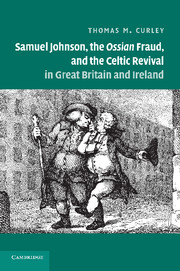Book contents
- Frontmatter
- Contents
- Prefatory acknowledgments
- 1 An introductory survey of scholarship on Ossian: why literary truth matters
- 2 James Macpherson's violation of literary truth
- 3 Johnson on truth, frauds, and folklore: in the company of Thomas Percy
- 4 Searching for truth in the Highlands: Macpherson throws down the gauntlet
- 5 Charles O'Conor and the Celtic Revival in Ireland
- 6 Johnson and the Irish: more opposition to Ossian
- 7 Johnson's last word on Ossian with William Shaw: a finale to controversy
- Appendix A A Reply to Mr. Clark's Answer
- Notes
- Bibliography
- Index
5 - Charles O'Conor and the Celtic Revival in Ireland
Published online by Cambridge University Press: 30 July 2009
- Frontmatter
- Contents
- Prefatory acknowledgments
- 1 An introductory survey of scholarship on Ossian: why literary truth matters
- 2 James Macpherson's violation of literary truth
- 3 Johnson on truth, frauds, and folklore: in the company of Thomas Percy
- 4 Searching for truth in the Highlands: Macpherson throws down the gauntlet
- 5 Charles O'Conor and the Celtic Revival in Ireland
- 6 Johnson and the Irish: more opposition to Ossian
- 7 Johnson's last word on Ossian with William Shaw: a finale to controversy
- Appendix A A Reply to Mr. Clark's Answer
- Notes
- Bibliography
- Index
Summary
Dr Johnson having a laudable passion for the Discovery of every useful matter hitherto hid in the old languages of Britain and Ireland, readily encouraged every attempt to throw light upon any Such matter.
Charles O'Conor to Joseph Cooper Walker, 10 January 1786Ireland's greatest living poet, Seamus Heaney, made glowing reference to Samuel Johnson during his acceptance of the 1995 Nobel Prize for Poetry, in order to underscore his artistic quest to capture the Shakespearean wholeness of our human reality within the complicated context of divided national identity: “In such circumstances, the mind still longs to repose in what Samuel Johnson once called with superb confidence ‘the stability of truth,’ even as it recognizes the destabilizing nature of its own operations and enquiries.” This chapter and the next highlight a rarely discussed, but fruitful, issue of scholarship on the age of Johnson, namely, Ireland's complex connection to the political entity of Great Britain and the role of the Ossian controversy in elucidating contemporary pressures of awakening nationhood in the land. The Ossian cause célèbre figured importantly in early formulations of national self-definition in Ireland during a Celtic Revival, which culminated in a brilliant epoch for writers of the magnitude of Yeats and Joyce. The story of Johnson's part in the controversy extends to the generally neglected but significant Irish literary renaissance commencing in the eighteenth century.
- Type
- Chapter
- Information
- Samuel Johnson, the Ossian Fraud, and the Celtic Revival in Great Britain and Ireland , pp. 123 - 155Publisher: Cambridge University PressPrint publication year: 2009



